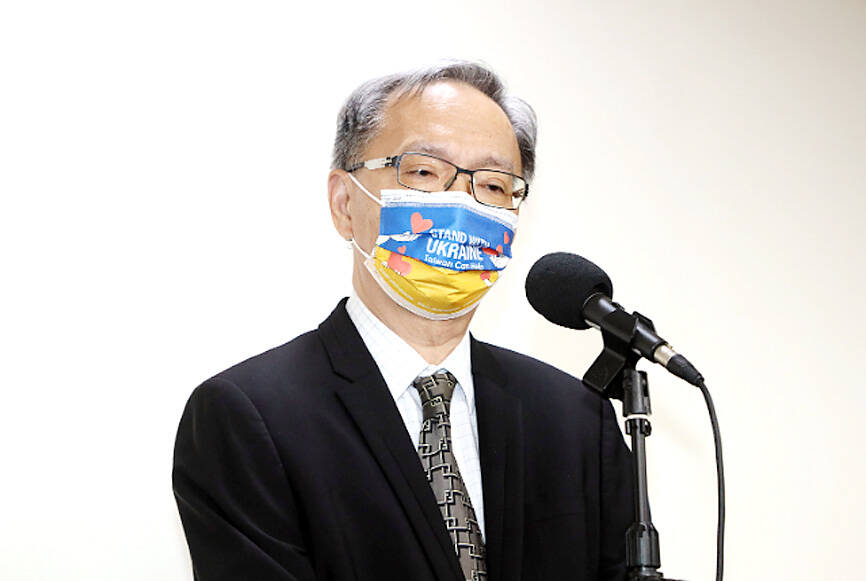Any move toward legalizing assisted suicide in the nation should be made with caution and start from the grassroots, as it would be “improper” for the government to take the lead on the policy, Minister of Health and Welfare Hsueh Jui-yuan (薛瑞元) said yesterday.
Hsueh made the remarks at a meeting in the Legislative Yuan, where he took several questions relating to famed sculptor Ju Ming (朱銘), who died by suicide at 85 over the weekend following years of chronic health problems.
Chinese Nationalist Party (KMT) Legislator Wen Yu-hsia (溫玉霞) said that Ju’s death and dozens of similar cases each year highlighted areas of Taiwan’s “long-term care” policies that still needed to be improved.

Photo: CNA
In making those reforms, the government should also consider the question of whether to legalize euthanasia, Wen said, but added that it would probably be difficult to reach a consensus at present.
New Power Party Legislator Chiu Hsien-chih (邱顯智) asked to what degree such issues could be handled under current laws, such as the Hospice Palliative Care Act (安寧緩和醫療條例) of 2000 and the 2019 Patient Right to Autonomy Act (病人自主權利法), which guarantees patients’ right to a good death.
Citing the Netherlands as an example of a country that has legalized euthanasia while maintaining “extremely rigorous standards,” Chiu asked whether the health ministry should initiate conversations with various sectors of society on the topic.
Hsueh said that with euthanasia, the crux of the issue is that it does not just involve a person who is ill and wants to end their life, but also another individual who has to actively assist them.
As this responsibility would currently fall on medical personnel, there is significant controversy over whether it should be allowed, he said.
Many cases, like Ju’s, have complex backstories, and should not be automatically attributed to failures in long-term care policies, he said.
As for the legal and ethical side of the issue, the laws cited by Chiu are sufficient at least for passive situations, in which doctors do not provide life-extending care if that is what the patient wants, he said.
However, in terms of physician-assisted suicide, the problem is that both the Hippocratic Oath and the policies of the World Medical Association are firmly opposed to it, Hsueh said.
Therefore, even if there were a legal basis for euthanasia, there might not be medical professionals willing to take part, he said.
Hsueh also appeared wary of engaging with medical associations on the issue, saying it would be “a bit strange” for the health ministry to be in the position of trying to convince doctors to breach their own professional guidelines.
Because of this, Hsueh said he believes that any plans to change the legal status of euthanasia should be made with caution, and should proceed from the bottom up.
“The government should not be enthusiastically promoting euthanasia. Having the government take the lead [on the issue] would be improper,” Hsueh added.

Alain Robert, known as the "French Spider-Man," praised Alex Honnold as exceptionally well-prepared after the US climber completed a free solo ascent of Taipei 101 yesterday. Robert said Honnold's ascent of the 508m-tall skyscraper in just more than one-and-a-half hours without using safety ropes or equipment was a remarkable achievement. "This is my life," he said in an interview conducted in French, adding that he liked the feeling of being "on the edge of danger." The 63-year-old Frenchman climbed Taipei 101 using ropes in December 2004, taking about four hours to reach the top. On a one-to-10 scale of difficulty, Robert said Taipei 101

A preclearance service to facilitate entry for people traveling to select airports in Japan would be available from Thursday next week to Feb. 25 at Taiwan Taoyuan International Airport, Taoyuan International Airport Corp (TIAC) said on Tuesday. The service was first made available to Taiwanese travelers throughout the winter vacation of 2024 and during the Lunar New Year holiday. In addition to flights to the Japanese cities of Hakodate, Asahikawa, Akita, Sendai, Niigata, Okayama, Takamatsu, Kumamoto and Kagoshima, the service would be available to travelers to Kobe and Oita. The service can be accessed by passengers of 15 flight routes operated by

Taiwanese and US defense groups are collaborating to introduce deployable, semi-autonomous manufacturing systems for drones and components in a boost to the nation’s supply chain resilience. Taiwan’s G-Tech Optroelectronics Corp subsidiary GTOC and the US’ Aerkomm Inc on Friday announced an agreement with fellow US-based Firestorm Lab to adopt the latter’s xCell, a technology featuring 3D printers fitted in 6.1m container units. The systems enable aerial platforms and parts to be produced in high volumes from dispersed nodes capable of rapid redeployment, to minimize the risk of enemy strikes and to meet field requirements, they said. Firestorm chief technology officer Ian Muceus said

MORE FALL: An investigation into one of Xi’s key cronies, part of a broader ‘anti-corruption’ drive, indicates that he might have a deep distrust in the military, an expert said China’s latest military purge underscores systemic risks in its shift from collective leadership to sole rule under Chinese President Xi Jinping (習近平), and could disrupt its chain of command and military capabilities, a national security official said yesterday. If decisionmaking within the Chinese Communist Party has become “irrational” under one-man rule, the Taiwan Strait and the regional situation must be approached with extreme caution, given unforeseen risks, they added. The anonymous official made the remarks as China’s Central Military Commission Vice Chairman Zhang Youxia (張又俠) and Joint Staff Department Chief of Staff Liu Zhenli (劉振立) were reportedly being investigated for suspected “serious